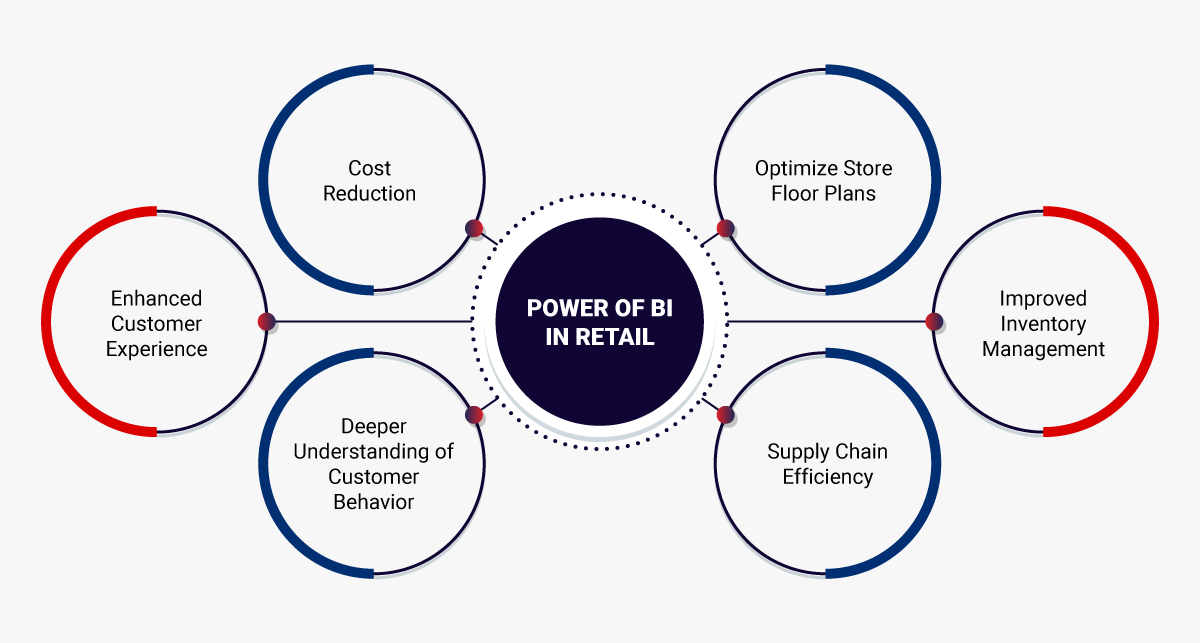Business intelligence in retail empowers modern-day retailers to tap into their customer data, helping them spot buying patterns, trace customer journeys, monitor product performance, and seize new market opportunities. By embracing BI’s capabilities alongside data management, analytics, and integration, BI solutions for retail have become an indispensable asset. With real-time access to the correct data, you can fulfill your customer’s needs and preferences, propelling your retail business to success.
This blog serves as your complete roadmap to grasp the crucial role of BI in the retail industry, highlighting its advantages through real-world examples. We’ll walk you through the essential integrations and core features for an effective retail business intelligence solution. Additionally, we’ll provide insights into the top BI tools and share tips on selecting the right platform to drive your retail business forward.
What is Retail Business Intelligence?
Retail BI is a technology-enabled process that helps uncover actionable insights by analyzing retail data for making smarter choices about inventory stocking, product placement and pricing, marketing, and other aspects. Retail Business intelligence presents accurate insights to decision-makers, enabling them to;
- Enhance customer satisfaction and retention by understanding your customers’ preferences.
- Optimized merchandise planning ensures the availability of the right products.
- Strategize marketing Campaigns by efficiently targeting the right audience.
- Identify new sales opportunities by seizing untapped potential.
There are various tools that you can use to enhance BI, including:
- Data Mining: Unearths hidden treasures within your data.
- Text Analytics: Deciphers textual data for meaningful insights.
- Predictive Analytics: Forecasts future trends and outcomes.
- Prescriptive Analytics: Offers actionable recommendations.
- Dashboards and Visualizations: Present data in user-friendly formats.
Choosing the right tools tailored to your specific needs and identifying the right metrics is crucial for extracting insights that maximize your benefits.
Role of Business Intelligence in Retail Industry
Retailers are sitting on heaps of data – right from customer purchases to inventory details, supplier data, and more. They are increasingly turning to BI tools to deliver exceptional value to customers. Armed with the right solutions, businesses can uncover insights that enhance store performance, inventory management, customer engagement, and product merchandising. While many businesses already use analytics and BI, there is an added advantage for decision-makers in harnessing retail business intelligence.
Enhancing the Shopping Experience
Business intelligence in the retail sector plays an essential role in tracking and understanding how customers interact with eCommerce stores. Imagine a scenario where customers receive personalized product suggestions based on their shopping history—this is just one way BI can enhance the shopping experience.
Real-Time Decision-Making
Accessing and analyzing data in real-time is a game-changer for retailers. With Business Intelligence Tools, businesses can swiftly adapt to market fluctuations, changing customer preferences, and emerging trends. Whether it’s adjusting merchandise offerings or promptly modifying prices, the agility offered by real-time data ensures that retailers can make smart and efficient decisions to stay competitive.
Bridge Between Online and Offline
Brick-and-mortar stores can also leverage BI to strike a balance between their online and in-store inventory. By doing so, they can offer cost-effective shipping options like in-store pickups or online purchases, catering to the preferences of modern shoppers. Retail giants like Home Depot and Walmart[1] are already capitalizing on BI to optimize inventory management and provide seamless shopping experiences.
Consistency Across Channels
Providing a consistent shopping experience across multiple channels is the key in the omnichannel retail era. Therefore, expanded access to BI facilitates operational and customer data, enabling retailers to create a uniform shopping experience across all touchpoints – online, in-store, or via mobile apps. This cohesion builds customer trust and loyalty.
Predictive Power
Predicting inventory needs is another area where BI shines. BI allows retailers to foresee stock shortages and replenish their inventory proactively. This predictive capability empowers retailers to make informed decisions about ordering, merchandising, and stocking, ultimately reducing costs and enhancing efficiency.
Emergence of Retail Business Intelligence Ecosystem
A technology-driven process helps translate raw data into meaningful insights to support better organizational decision-making. It typically involves using analytics to identify trends and patterns, though it can be done in multiple ways. This is especially useful in improving customer engagement, where real-time data tools are useful. This enables sales teams to draw customer histories, habits, and possible interest avenues. The better you know about your customers, the better you can connect and provide great service.
Benefits of Business Intelligence in Retail Industry
The idea of BI in retail industry is to help businesses operate in a smarter & agile way. Here are some of the major benefits that retailers can exploit and how it can help them to stay ahead of the competition.

Optimize Store Floor Plans
BI software can help retailers to design a floor plan that allows customers to shop without hassle. This helps determine whether the selected floor plan is sufficient for the floor size and product types. It can analyze various data sets using BI solutions (number of stops, visit duration, etc.) and recommend a floor plan that will help consumers easily find products.
Improved Inventory Management
Any retail company holding stocks can encounter inventory challenges ranging from inefficient tracking to overstocking issues. Investing in a business intelligence solution can simplify inventory management and solve most of the stock-related challenges. This system enables optimal stock levels, reduces inventory costs, and improves order management and processing. It also helps predict overstocking scenarios before they become a significant problem.
Supply Chain Efficiency
Today, supply chains have become more complex as retailers engage with merchants to sell more of their products. This could lead to inefficiencies and an increase in underperforming departments with limited/no visibility into different distribution channels. However, the BI system can give key insights gained from day-to-day operations. This allows businesses to create a logical forecast model as well as identify and eliminate logistical bottlenecks that the supply team could address.
Now that you’ve understood the advantages of business intelligence for the retail industry, let’s also look at the challenges of BI in the retail sector and how some of the significant players are leveraging the same.
Cost Reduction
One of the most compelling benefits of Business Intelligence (BI) in the retail industry is its ability to drive significant cost reductions. Retailers can identify areas where unnecessary expenses can be trimmed by analyzing various facets of the business, such as supply chain, inventory management, and marketing campaigns. For instance, BI can pinpoint inefficiencies in the supply chain, helping retail companies streamline logistics and reduce shipping costs. It can also optimize inventory levels, thus preventing overstocking or understocking issues that lead to financial losses.
Enhanced Customer Experience
BI plays a fundamental role by enabling retailers to gain profound insights into customer behavior and preferences. By analyzing customer data, retailers can create personalized shopping experiences that cater to individual tastes. For example, they can offer product recommendations based on past purchases or browsing history, thereby enhancing the likelihood of conversion. Also, BI tools empower retailers to improve customer service by identifying and addressing real-time pain points. This proactive approach resolves issues promptly and fosters customer loyalty and trust.
Deeper Understanding of Customer Behavior
With BI, retailers can discover who their customers are, how they behave, and what they want. This information is crucial to boost CX and enhance marketing initiatives. For example, retailers can use customer analytics by utilizing a BI tool that helps create products or services to meet end-user expectations. Analytics can even help marketers craft data-driven customer journey maps by providing insights about how customers interact with products, websites, or businesses.
Common Retail Business Intelligence Challenges and How to Overcome Them
Successfully adopting a BI solution is vital to maximizing your business benefits, but it comes with its own share of challenges. Here, we will explore the three most common hurdles retailers face when leveraging BI in the retail sector and offer practical solutions to help you overcome the obstacles that impede informed decision-making.
Data Quality
Challenge:
- Inaccurate data can lead to misguided decisions.
Solution:
- Establish data quality standards and processes.
- Regularly audit and clean your data to eliminate errors.
- Make sure the data sources are reliable and consistent.
- Invest in data validation tools to catch and correct inaccuracies.
Security Concerns
Challenge:
- Retailers handle sensitive customer and financial data. Ensuring the security of this data is paramount.
Solution:
- Implement robust security measures, including encryption and role-based access controls.
- Regularly update security protocols to address emerging threats.
- Comply with data protection regulations and conduct regular security audits.
Data Overload
Challenge:
- Retailers gather vast amounts of data, from sales figures to customer behavior, which can overwhelm BI systems. Sorting through this data can be a daunting task.
Solution:
- Start by defining clear objectives. What insights do you need? Tailor your BI system to focus on these specific goals.
- Regularly clean and organize your data to remain relevant and valuable.
- Implement data visualization tools to transform complex data into easily digestible visual formats.
Business Intelligence is significantly revolutionizing the retail industry by proactively addressing common challenges. If you need help to stay ahead of the curve by legging up competition, connect with us to leverage our BI consulting services to get strategic guidance on how to eliminate data silos and offer the most value to your end customers.
BI Applications in Retail Industry
From optimizing inventory management to tailoring marketing campaigns and identifying market trends to predicting demand, BI is the driving force behind the evolution of retail. Let’s dive into its practical applications and discover how BI is driving retail success with enhanced efficiency, service quality, and customer satisfaction.
Sales and Inventory Management
BI helps retailers analyze historical sales data to predict future demand accurately. This, in turn, aids in optimizing inventory levels and reducing overstocking or understocking issues. By aligning supply with demand, retailers can ensure that products are available when customers want them, thus minimizing losses and boosting efficiency.
Customer Analytics
Understanding your customers is vital in retail. BI tools dive deep into customer data, such as purchase history, browsing patterns, and demographic information. Retailers can use these insights to create personalized shopping experiences. For instance, offering product recommendations based on past purchases or tailored promotions that cater to individual preferences.
Supply Chain Optimization
A well-functioning supply chain is crucial for retail success. BI tools track the movement of products, providing real-time visibility into the supply chain. It enables retailers to spot bottlenecks, optimize routes, and enhance supply chain efficiency. It does not only reduces costs but also ensures that products reach customers faster.
Marketing Effectiveness
BI tools evaluate the impact of marketing campaigns. Retailers can measure which advertising channels yield the best results and allocate their marketing budget accordingly. Businesses can also refine their marketing strategies for maximum impact by tracking the ROI of different marketing efforts.
Retail Business Intelligence Solution: Essential Integrations
Business Intelligence (BI) solutions are invaluable for retailers, offering data-driven insights that can shape strategies and drive success. Integrating essential systems and data sources is crucial to maximizing these BI solutions. Here, we’ll explore some of the must-have integrations for retail BI solutions.
Customer Relationship Management (CRM) Software
CRM integration empowers retailers to analyze customer data comprehensively. It combines transaction history, contact information, and customer interactions, allowing retailers to segment customers, personalize marketing campaigns, and enhance customer retention efforts.
E-commerce Platforms
E-commerce integration enables retailers to capture data from online sales, including website traffic, conversion rates, and abandoned carts. This information helps understand online customer behavior, optimize the online shopping experience, and fine-tune digital marketing strategies.
Point of Sale (POS) Systems
Connecting with point-of-sale (POS) systems empowers retailers to acquire immediate sales data, specifics of transactions, and customers’ buying histories. When this data is merged with Business Intelligence (BI) tools, it equips retailers with valuable insights into sales patterns, customer actions, and product effectiveness.
Supply Chain Management Systems
Integrating BI with supply chain management systems helps retailers streamline complex supply chain and logistics. It offers real-time visibility into the movement of products, assisting businesses in identifying bottlenecks, optimizing routes, and improving overall supply chain efficiency.
Inventory Management Systems
Effective inventory management is crucial for retailers. Integrating BI solutions with inventory management systems provides a holistic view of stock levels, order statuses, and supply chain data. This helps retailers optimize inventory turnover, reduce carrying costs, and prevent stockouts or overstocking.
Successful implementation of retail BI solutions depends on seamless integration with essential systems and data sources. These integrations empower retailers to extract maximum value from their data, optimize operations, and make data-driven decisions that can boost efficiency and competitiveness in the retail industry.
Must-Have Core Features for Retail BI Solution
To get the most out of BI in the retail industry, it’s crucial to understand the must-have core features that will up your analytics game. This section will explore the core features you should prioritize when integrating a BI solution for your retail business. These features are crucial to improving your decision-making and ensuring your BI solution suits your specific retail needs and goals. Let’s get started on the essentials of a successful retail business intelligence solution.
Data Integration
It helps to collect data from disparate sources like sales transactions, inventory, customer data, and social media and consolidate them into a single data set to make strategic decisions.
Data Visualization
The graphical representation helps to translate complicated data into visual elements like charts, graphs, and maps. Imagine it as a language that converts numbers into vivid images. It allows decision-makers to translate information into a visual context easily.
Data Security and Compliance
Data security ensures that your sensitive retail data is protected from unauthorized access. Compliance ensures you meet legal and industry-specific regulations. Protecting customer data and complying with regulations like GDPR or PCI DSS is crucial to avoid costly fines and maintain customer trust.
Data Catalogs
Consider data catalogs to be organized libraries where users can quickly locate and access analytics content. Data catalogs streamline data access, making your BI solution user-friendly.
Augmented Analytics
It works as a data assistant that enhances your data with Machine Learning techniques. Augmented analytics simplifies complex data analysis, helping you uncover valuable insights quickly.
Natural Language Support
It leverages Natural Language Query (NLQ) to enable users to interact with data using plain language, making data analysis accessible. It empowers non-technical users to harness the power of data analytics, promoting wider adoption.
Real-World Examples of BI in Retail Industry
Let’s turn to some real-world examples to fully grasp the potential of BI applications in retail industry and explore how BI is actively reshaping retail operations for the better. These practical use cases provide a firsthand look at BI’s impact on business outcomes and the transformative power of data-driven decision-making.
Starbucks
The Seattle-based coffee chain leverages BI to a great deal. With the widely popular loyalty card program, it gains access to large volumes of data. By bringing the right system in place, the coffee giant can predict what individual customers will order next. This encourages offering more personalized experiences with every in-store visit, thus increasing overall sales.
Amazon
Based on the search and surfing trends, Amazon today can personalize product recommendations for a specific type of customer and market products effectively. They even leverage data to make accurate and logistical business decisions. An outcome of comprehensive data analysis enables the eCommerce giant to manage its huge supply chain efficiently.
Coca-Cola
Automating manual reporting processes by utilizing BI, the multinational beverage company saved 260 hours a year! Additionally, report automation allows sales teams to utilize the right customer relationship management (CRM) data that helps with timely and actionable information.
Netflix
A streaming platform employs BI to suggest movies and TV series to its viewers. The company relies on BI to monitor user viewing habits, like which films and shows users have seen and the time invested in each. This data assists Netflix in making recommendations for movies and TV shows that align with users’ preferences and are likely to be enjoyable for them.
Rishabh’s Success Stories
With a deep understanding of this massive sector, Rishabh has supported global organizations with their retail business intelligence needs.
Here’s a look at how we have helped our clients:
Sales Dashboard Development
A Middle Eastern retail company with multiple businesses under various segments struggled with multiple applications and no proper insights.
The solution addressed challenges like:
- The lack of a centralized reporting system meant that management teams were unable to make informed decisions
- No proper tracking and monitoring of KPIs across business segments
Upon careful analysis of their business needs, we developed a BI reporting system and created dashboards for CEO summaries and strategies. We also assisted with the integration of various applications to provide centralized reporting that would help users at various levels.
The developed solution resulted in the following:
- 100% accurate trend insights & forecasting
- 5X improvement in effective decision-making
Store-wise analysis & comparison with the previous year’s sales
Multi-Channel eCommerce Management Solution
An Asian eCommerce company with a presence in Indian and international markets envisioned wider consumer & branch reach, along with a boost in sales. As their preferred tech partner, we helped our client by developing an intuitive and robust multi-channel e-Commerce management solution that helped sellers host their products and list them on multi-channel platforms like Amazon, Flipkart, Snapdeal, and more.
The solution addressed the following challenges:
- Poor tracking of product listing, product reviews & ratings
- No custom reports across inventory management, order processing, CRM
- Lack of integration capability & data pulling from third-party product listing platforms
The newly developed solution resulted in:
- 80% client retention with optimum quality
- 4X increase in operational efficiency
- Modern & responsive user experience
Top Business Intelligence Tools for Retail Industry
For the above-listed companies, predicting outcomes would have become a headache without the right tools at their disposal. Here’s an overview of some of the top BI tools that will give you a pulse on your business:
Microsoft Power BI
This tool from Microsoft features interactive business intelligence capabilities that offer intuitive visualization capabilities to create smart reports and dashboards. The tool comes with in-build AI capabilities and pre-built data connectors.
As part of the Microsoft ecosystem, it offers easy integration with other resources, including MS Azure, Microsoft 365, and more. It also provides end-to-end encryption to assist you with real-time monitoring. Working with an experienced Power BI development company can help you transform large-scale enterprise data sets into rich dashboards and reports that drive smarter business decisions.
Tableau
It provides varied dashboard development capabilities to consolidate data on a single platform – and extract actionable insights from customer journey to sales, performance, and more. With an intuitive interface similar to Power BI, it makes data exploration easy, and it supports visual query language that even non-technical users can utilize.
Tableau also helps combine raw, relational, and semi-structured data in real time. With an automatic forecasting feature, you can choose from eight time-series forecasting models by automatically selecting the parameters.
BI Platform Selection Guidelines for Success
When analyzing the BI market, you would realize there’s no shortage of vendors and platforms. The key to success would be finding a solution that best fits the specific business needs after conducting an in-depth assessment of the requirements.
Listed below are a few criteria:
- Establish clear objectives for BI application & use case.
- Develop a solution specifically designed for a modern retail environment.
- Implement and execute a rigorous change management plan comprising measures to attain stakeholders’ buy-in.
- Ensure the right competencies are mapped to implement the solution OR seek aid from IT specialists like Rishabh Software, who have prior experience in delivering BI projects.
- Finalize the vendor who can provide strategic and technical support throughout your solution development lifecycle.
- Many companies ignore this, but developing post-deployment BI governance policies and data-quality maintenance metrics is vital.
As Rishabh, we consult retail companies to implement the most suitable BI solution.
For creating a custom solution, any company conducts:
- Collection, management, and prioritization of business requirements.
- Designing a BI solution that meets the precise business requirements.
And while designing a BI solution, the company must choose BI tools according to its needs and restraints. Among the most common are Microsoft Power BI, Tableau, and more.
With tool selection, it is essential to work on the listed points:
- Defining KPIs
- Defining QA processes
- Designing – implementation strategy & user adoption strategy
- Development and implementation of all components within the BI solution
- Holding user training sessions for KT
- Mapping and managing solution support and evolution
We can help you through the entire process of understanding, designing, building, and deploying the right system.
Why Choose Rishabh Software to Implement Retail Business Intelligence Solution
With Rishabh Software as your retail business intelligence partner, you can be confident that your data capabilities will scale seamlessly. We provide flexibility and scalability to handle increasing data volumes and complexity. By choosing Rishabh Software as your BI retail implementation partner, you can make all the difference by achieving analytics transparency, cutting operational costs, driving sales, and uncovering customer needs.
Wrapping Up
The advantages of business intelligence in the retail industry are endless. From offering clear insights into business trends to improving customer experiences, it helps enhance a business’s proficiency and enables smart decision-making.
With our Business Intelligence Development services, you can expect an experienced team of professionals eager to implement and offer true intelligence to your business while taking care of possible data challenges at the same time. If you experience difficulties choosing the right BI tool to suit your needs, developing a BI solution, or defining how BI as a service will work for you, we’re your technology experts who care.
Frequently Asked Questions
Q: How can I use Business Intelligence in my Retail Business?
A. Business Intelligence (BI) can be a valuable tool for making informed decisions and enhancing performance in your retail business. Start by collecting data from sales transactions, inventory records, and customer interactions. Then, leverage BI software to analyze this data and create insightful reports and visual representations. BI helps you understand customer preferences, determine sales patterns, optimize inventory management, and set competitive pricing.
It also lets you monitor how well your marketing efforts are doing, making it easier to enhance different parts of your business.
Q: How Would the Retail Industry Use Business Intelligence?
A. The retail industry can use the power of Business Intelligence (BI) to enhance diverse aspects of its operations. Retailers can employ BI to study sales data and customer behaviors, enabling personalized marketing strategies, demand forecasting, and efficient inventory management.
BI tools can also streamline supply chain operations, identify cost-saving opportunities, and optimize efficiency. Also, BI assists in monitoring and fine-tuning store performance, enabling data-driven decisions that lead to heightened profitability and greater customer satisfaction.
Footnotes:











 30 Min
30 Min


